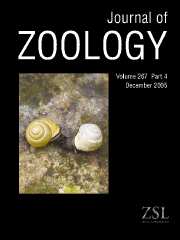Article contents
Relative timing of ontogenetic events in primates
Published online by Cambridge University Press: 18 October 2004
Abstract
Heterochrony is commonly proposed as a mechanism producing evolutionary changes, and some researchers identify two ways that heterochrony may be conceptualized. ‘Growth heterochrony’ examines ancestor-to-descendant differences in the ontogeny of size relative to shape, while ‘sequence heterochrony’ focuses on differences in the order of occurrence of events during ontogeny. Methods introduced here are allied with sequence heterochrony in that ontogeny is modelled as if it were a sequence of events; however, events are differently defined in this study. Using data from 16 primate species, I demonstrate that discriminant function analysis of data on developmental timing provides an additional tool for exploring the relationship between ontogeny and phylogeny. Patterns in the timing of tooth eruption, craniofacial sutural closure, and postcranial epiphyseal fusion can be used to classify individuals of all ages to their correct taxon. Taxon differences in these patterns can be characterized and described by interpreting correlations between discriminant functions and developmental events. Discriminant analysis has the advantages of: (1) being applicable to taxa for which there are too few individuals to be able to reconstruct ontogenetic sequences, including fossil species; (2) preserving intraspecific developmental variation during analysis; (3) being sensitive to very subtle differences in ontogenetic timing.
- Type
- Research Article
- Information
- Copyright
- 2004 The Zoological Society of London
- 15
- Cited by


